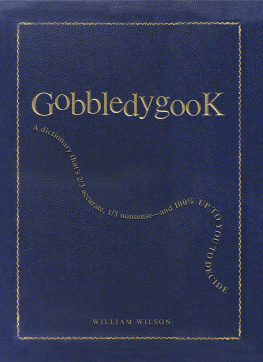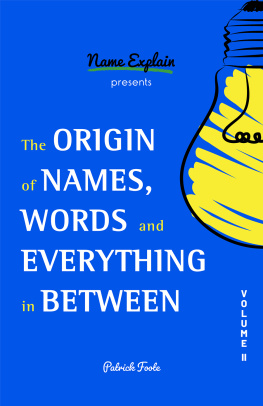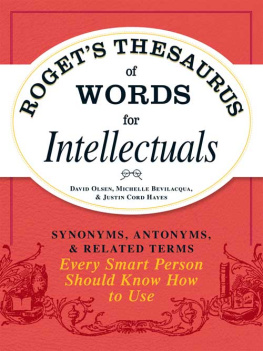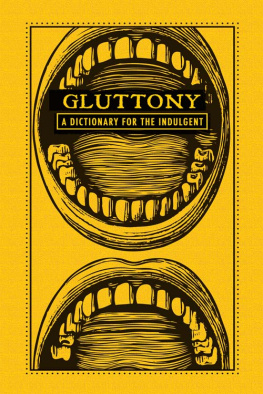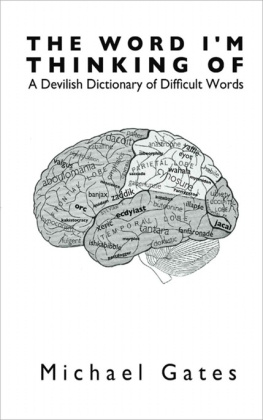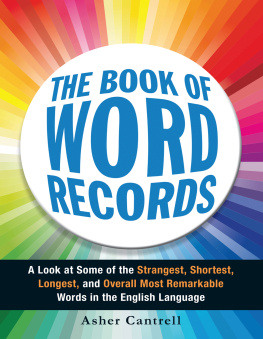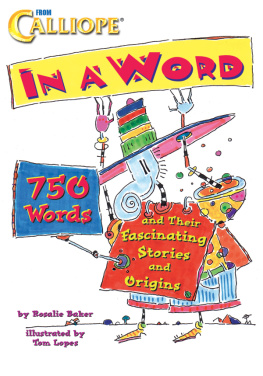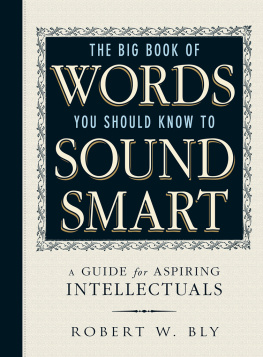Dedication / Acknowledgments
I would like to acknowledge students at High Point Central High School for coming up with a handful of the nonsense words. Thanks to Peter Archer for supplying some of the odd real words. I would like to dedicate this book to my family: my wife, Tiffany; my son, Parker-John; my stepson, Jake; and my stepdaughter, Abigail. I would also like to thank Justin Cord Hayes, sine qua non.
Copyright 2011 by F+W Media, Inc.
All rights reserved.
This book, or parts thereof, may not be reproduced in any
form without permission from the publisher; exceptions are
made for brief excerpts used in published reviews.
Published by
Adams Media, a division of F+W Media, Inc.
57 Littlefield Street, Avon, MA 02322. U.S.A.
www.adamsmedia.com
ISBN 10: 1-4405-2818-7
ISBN 13: 978-1-4405-2818-7
eISBN 10: 1-4405-2924-8
eISBN 13: 978-1-4405-2924-5
Printed in the United States of America.
10 9 8 7 6 5 4 3 2 1
Library of Congress Cataloging-in-Publication Data
is available from the publisher.
This publication is designed to provide accurate and authoritative information with regard to the subject matter covered. It is sold with the understanding that the publisher is not engaged in rendering legal, accounting, or other professional advice. If legal advice or other expert assistance is required, the services of a competent professional person should be sought.
From aDeclaration of Principles jointly adopted by a Committee of the American Bar Association and a Committee of Publishers and Associations
Many of the designations used by manufacturers and sellers to distinguish their product are claimed as trademarks. Where those designations appear in this book and Adams Media was aware of a trademark claim, the designations have been printed with initial capital letters.
This book is available at quantity discounts for bulk purchases.
For information, please call 1-800-289-0963.
Introduction
So, you think youre King Wordsmith, do you? Well, Your Highness, this book will put you to the test.
Ive sailed the sea of words that comprise the English language and have returned with a fine catch of little-known, obscure, archaic, outdated, and idiosyncratic terms and expressions. And Im willing to bet that among them are more than a few that will make that crown rest uneasily on your brow.
Ready? Open the book and thumb through it. On each right-hand page youll find three words. Two of them are obscure, but legitimate, words you would find in an unabridged dictionary (very unabridged). One of them, however, is a neologism better known as a fake word, made up to fool you. Its up to you to figure out which is realand which is false.
What follows then is a sophisticated game for the intellectually aspiring. You can play by yourself while sipping a glass of ice-cold sherry and nibbling on shrimp in a garlic-butter sauce.
Or you can challenge your guests at your next dinner party, as all of you roll your favorite varietal gently on your palate and pass around the walnuts and Brie.
In teams (if there is an abundance of you) or individually (if but a few), read the words alouda handy pronunciation guide is included with each wordalong with their parts of speech and their definitions. See if your opponent(s)or youcan guess the fake word. If they do, then give them a point. Perhaps you can go for, say, best of ten or best of twenty, or just see who gets to a certain number first.
In addition to the words themselves, Ive filled Gobbledygook chock-full of trivia relatedsometimes directly and sometimes very tangentiallyto many of the words. If youve played this game by yourself, then you can impress your friends with your trivial knowledge, which should get you invited to a lot more cocktail parties or at least to the types of parties where people like talking about words and playing word games. Be prepared to turn to one of your fellow guests and say, casually, Are you aware that xarque (pronounced SHAR-kay) is a Portuguese form of beef jerky? Or, perhaps, not. Then smile mysteriously and glide off to the bar for another white wine.
Good luck!
ab absurdo, capacitance, bibliometagraphia
- ab absurdo (ab-uhb-SIR-doh) (adv. or adj.): An argument or statement that is false because it is patently absurd. The next time you think someone is full of it, cry ab absurdo! Democrats wont raise taxes? Ab absurdo! Republicans really care about people without money? Ab absurdo!
- capacitance (kuh-PASS-uh-tuhnts) (noun): The property of an electric nonconductor permitting energy storage as the result of electric displacement when opposite surfaces of the nonconductor are maintained at a difference of potential. The inverse of capacitance is called elastance.
- bibliometagraphia (bib-lee-oh-met-uh-GRAPH-ee-uh) (noun): Data compiling the length of a string of words a person has read, based on page count, book size, and other factors. The words roots are Greek: biblion (book); graphos (to write). Libraries use this data to make decisions about purchases; determining, for example, if a book should be in the circulating or in the reference library.
The fake word is:
bibliometagraphia
Although you might think it would be useful for libraries to have some idea of how many words the average reader goes through in a given year, theres no such word as BIBLIOMETAGRAPHIA. Libraries make decisions about whether a book should circulate based on the condition and rarity of the book, its cost to the library, how often its consulted by users, and other factors. Sadly, though, how many words the average reader reads isnt one of the metrics in deciding this.
Speedy Reader
Howard Stephen Berg claims the record for the fastest reader in the world. According to Guinness Book of World Records, Berg clocks in at 80 pages or approximately 25,000 words per minute. However, he admits that at this speed he only gets the general concepts and not the details of what he reads. In a televised test, however, Berg only managed about 30 pages or 5,500 words a minute. Still, even at that reduced pace, Berg would be able to speed-read the King James Bible (783,137 words) in about 142 minutesor two-and-a-half hours.
delatynite, scrapulous, humuhumunukunukuapuaa
- delatynite (duh-LAT-uh-night) (noun): Sulfur-lacking amber, high in carbon, found at Delatyn in the Carpathian mountains of Galicia. Galicia, for those of you who are a bit shaky on geography, is part of the Ukraine. The town of Delatyn was at various points passed back and forth between Poland, the Austro-Hungarian Empire, and the Soviet Union.
- scrapulous (SCRAP-yuh-luss) (adj.): Coming from an Old Norse root meaning scrape, scrapulous describes jagged and uneven surfaces likely to cause injury to the unsuspecting. The word was first used by James Boswell in his Journal of a Tour to the Hebrides : Outside Dundee we climbed a small mountainside, Dr. Johnson commenting much upon the scrapulous character of the rocks.

